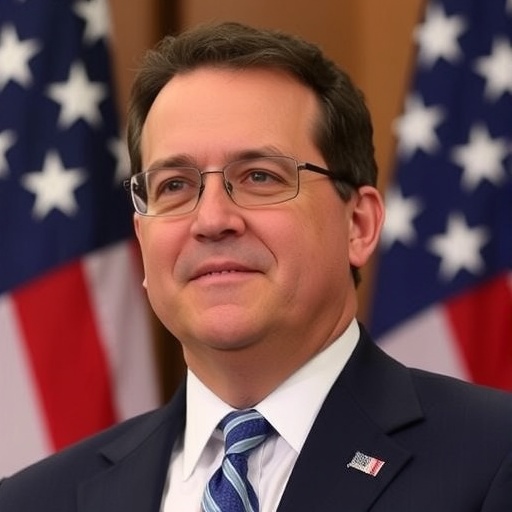Senate Blocks Trump’s Paul Ingrassia Nomination for Office of Special Counsel Over Racist Texts Controversy
In a stunning blow to President-elect Donald Trump’s early agenda, Senate Majority Leader John Thune has indicated that the confirmation of Paul Ingrassia as head of the Office of Special Counsel is highly unlikely to proceed, following the surfacing of alleged racist and extremist texts linked to the nominee. This development, reported late Wednesday, underscores the challenges Trump faces in securing Senate approval for his picks amid heightened scrutiny over inflammatory online rhetoric.
- Thune Draws a Line: No Path Forward for Ingrassia’s Senate Confirmation
- Exposed Messages: The Racist Texts That Torpedoed Paul Ingrassia’s Bid
- Office of Special Counsel Under Fire: Why This Agency Matters in Trump’s Second Term
- GOP Divisions Deepen: Reactions from Republicans and Democrats on the Ingrassia Nominee
- Future Ramifications: How the Ingrassia Stumble Shapes Trump’s Senate Battles Ahead
The revelation of these texts, first published by investigative outlets, has ignited a firestorm in Washington, D.C., with Democrats decrying the nomination as unfit and even some Republicans expressing reservations. Ingrassia, a conservative lawyer and commentator known for his vocal support of Trump, was tapped to oversee the Office of Special Counsel—a federal agency tasked with protecting federal employees from prohibited personnel practices and enforcing the Hatch Act. But the shadow of these messages threatens to derail his path to confirmation before it even begins.
Thune Draws a Line: No Path Forward for Ingrassia’s Senate Confirmation
Senate Majority Leader John Thune, R-S.D., wasted no time in signaling the nomination’s grim prospects during a press briefing on Capitol Hill. “Look, we’ve got a lot on our plate, and nominations like this one are going to face serious hurdles if there’s credible evidence of problematic behavior,” Thune stated, according to reports from Politico. His comments came just hours after the texts surfaced, suggesting that the Senate, now under Republican control but with a slim majority, is unwilling to risk the political capital required to push through such a controversial figure.
Thune’s stance is particularly telling, as he was instrumental in navigating Trump’s cabinet confirmations during the first term. Sources close to the Senate leadership told Reuters that internal GOP discussions have already shifted toward shelving the nomination entirely, potentially avoiding a floor vote altogether. This move would mark an early test of the party’s unity under Trump’s influence, especially as the Senate prepares for a busy session starting in January 2025.
The Office of Special Counsel, established under the Civil Service Reform Act of 1978, plays a crucial role in safeguarding whistleblowers and investigating Hatch Act violations—rules that prohibit federal employees from engaging in partisan political activities. Nominating Ingrassia to lead it was seen by Trump allies as a strategic play to install a loyalist in a position that could influence federal workforce policies. However, the emergence of the texts has flipped the narrative, turning what was intended as a straightforward appointment into a liability.
Exposed Messages: The Racist Texts That Torpedoed Paul Ingrassia’s Bid
The controversy erupted when a series of screenshots from private group chats, purportedly involving Paul Ingrassia, were leaked to the media. The messages, dating back to 2020 and 2021, include inflammatory language targeting racial minorities, including derogatory references to Black Lives Matter protesters and antisemitic tropes. One particularly damning text, shared widely on social media, reads: “These people are destroying our country from within,” accompanied by memes that critics have labeled as white supremacist in nature.
Investigative journalist Josh Dawsey of The Washington Post verified the authenticity of several messages through multiple sources familiar with Ingrassia’s online circles. Ingrassia, who has built a career as a legal analyst for outlets like The Federalist and a frequent guest on conservative podcasts, has not publicly denied the texts but issued a statement through a spokesperson calling them “taken out of context” and “part of heated private discussions during a turbulent time.”
Experts in digital forensics, speaking to CNN, noted that the texts align with patterns seen in far-right online communities, where coded language often masks overt racism. The Anti-Defamation League (ADL) quickly condemned the content, with spokesperson Jonathan Greenblatt tweeting: “Nominations to federal office demand the highest standards. Extremist rhetoric has no place in our government.” This scandal echoes past controversies, such as the 2018 withdrawal of Trump’s nominee for the Federal Reserve over similar social media posts, highlighting a recurring vulnerability in the vetting process for Trump nominees.
Ingrassia’s background adds layers to the story. A Harvard Law School graduate and former clerk for a federal judge, he gained prominence during the 2020 election cycle by filing lawsuits challenging results in battleground states on behalf of Trump allies. His nomination was announced in mid-December 2024, amid Trump’s flurry of post-election appointments, but the rapid backlash has left supporters scrambling to defend him.
Office of Special Counsel Under Fire: Why This Agency Matters in Trump’s Second Term
The Office of Special Counsel (OSC) might not grab headlines like the FBI or DOJ, but its influence on the federal bureaucracy is profound. With a budget of approximately $30 million and a staff of around 150, the OSC handles over 10,000 cases annually, according to its 2023 report. These include whistleblower protections, which have surged in recent years amid concerns over government transparency, and enforcement actions that can result in fines or removals from office.
Under Trump’s first administration, the OSC was criticized by labor unions for allegedly under-enforcing Hatch Act violations against political appointees. Appointing Ingrassia was viewed by conservatives as a chance to realign the agency with an “America First” ethos, potentially curbing what they see as bureaucratic overreach. However, the racist texts have raised alarms about impartiality. “The head of OSC must be above reproach, especially when dealing with sensitive employee rights,” said Debra Katz, a prominent employment lawyer, in an interview with NPR.
Statistics from the Merit Systems Protection Board show that OSC interventions have protected over 5,000 whistleblowers since 2017, often in cases involving national security or public health. In a second Trump term, with promises of mass federal workforce reforms—including the controversial Schedule F executive order—the OSC could become a battleground. Critics fear that an extremist leader might weaponize the office against perceived disloyal employees, while supporters argue it would streamline efficiency.
The nomination’s stall could delay Trump’s broader plans. The Senate must confirm over 1,000 appointees in the coming months, and early setbacks like this one might embolden opponents to scrutinize others more closely. Legal scholars, such as those at the American Bar Association, have called for robust background checks, pointing to a 2022 GAO report that found inconsistencies in social media vetting for executive branch roles.
GOP Divisions Deepen: Reactions from Republicans and Democrats on the Ingrassia Nominee
Within the Republican caucus, opinions on Paul Ingrassia are fracturing. While hardline Trump loyalists like Sen. Ted Cruz, R-Texas, have defended the nominee—tweeting that “the media is on a witch hunt”—moderates such as Sen. Susan Collins, R-Maine, have voiced concerns. In a statement to Fox News, Collins said: “Integrity is paramount for any federal appointment. We’ll review all evidence carefully.” This split mirrors broader tensions in the party as it balances Trump’s base with electability in swing states.
Democrats, holding a minority but vocal presence, have seized the moment. Senate Minority Leader Chuck Schumer, D-N.Y., demanded an immediate investigation, stating in a floor speech: “This is not just about one man; it’s about the soul of our institutions.” Progressive groups like the Congressional Black Caucus have mobilized, with Rep. Jamie Raskin, D-Md., warning of “a pattern of extremism in Trump’s circle.”
Polling data from Quinnipiac University, released Thursday, shows 62% of Americans oppose nominees with histories of racist statements, even among Republicans where support dips to 45%. This public sentiment could pressure senators facing re-election in 2026. Advocacy organizations, including the NAACP, have launched petitions urging the Senate to reject Ingrassia outright, amassing over 50,000 signatures in 24 hours.
The fallout extends to Trump’s inner circle. Advisers like Stephen Miller, architect of immigration policies, have reportedly urged a quick pivot to an alternative nominee, while others insist on fighting the allegations. Ingrassia’s allies point to his pro bono work defending conservative causes, but the texts have overshadowed his resume, drawing comparisons to the 2020 ousting of Trump’s CDC nominee over financial disclosures.
Future Ramifications: How the Ingrassia Stumble Shapes Trump’s Senate Battles Ahead
As the dust settles on Paul Ingrassia’s stalled nomination, the ripple effects on Trump’s Senate agenda are becoming clear. With the GOP holding a 53-47 majority, every vote counts, and controversies like this could erode support for other Trump nominees, such as those for the judiciary or cabinet. Political analysts predict a more cautious approach from the White House, potentially leading to “safer” picks that avoid social media minefields.
Looking forward, the Office of Special Counsel vacancy might persist into the spring, forcing interim leadership and delaying key investigations. This could impact ongoing probes into federal election interference or COVID-19 response missteps from the prior administration. Moreover, it highlights the evolving role of digital footprints in confirmations; a 2024 study by the Brennan Center for Justice found that 70% of recent Senate rejections involved online controversies.
For Ingrassia personally, the scandal may end his federal aspirations but bolster his profile in conservative media. He’s already booked on several podcasts to share his side. Meanwhile, Senate Democrats are pushing for legislative reforms to strengthen vetting processes, including mandatory social media audits for nominees.
In the broader context of Trump’s return to power, this episode serves as a cautionary tale. With promises of draining the swamp anew, avoiding self-inflicted wounds will be essential. As one Capitol Hill veteran told The Hill anonymously: “The Senate isn’t the House; it won’t rubber-stamp everything.” The path ahead for Trump’s team involves navigating these shoals carefully, lest more nominations capsize before they sail.








